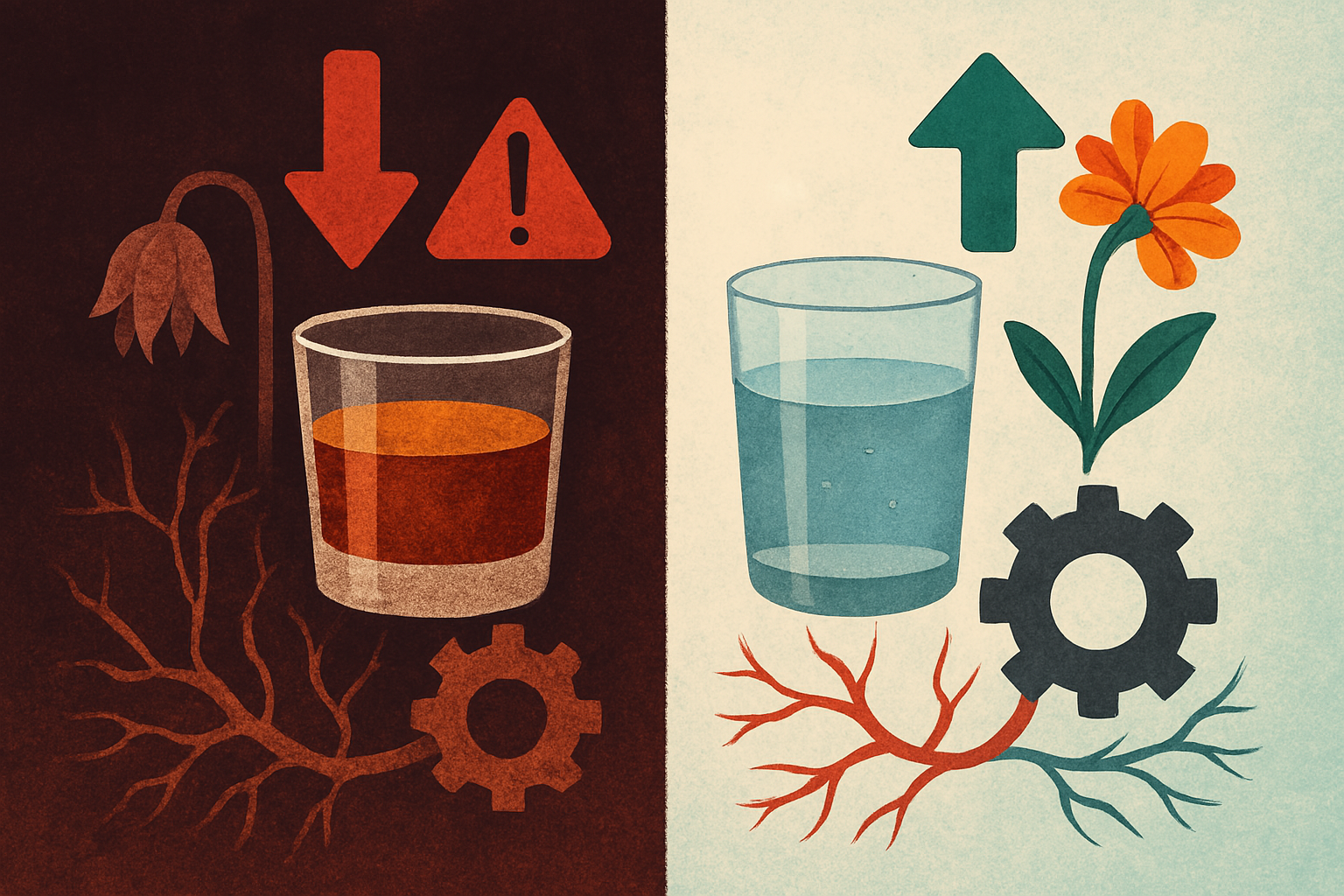When One More Drink Becomes a Problem
Alcohol is often associated with relaxation, confidence, and social connection. In small amounts, it can ease anxiety and reduce sexual inhibitions. But when it comes to erectile function, too much alcohol does more harm than good. Heavy or frequent drinking is a major contributor to erectile dysfunction (ED) — especially when it becomes a long-term habit. Understanding the link between alcohol and ED can help you make informed decisions that support both your health and your sex life.
How Alcohol Affects Erections
Alcohol is a central nervous system depressant, meaning it slows brain function and body processes. While this can reduce tension and make you feel more at ease, it also dulls nerve sensitivity, reduces blood flow, and impairs communication between the brain and body. Erections depend on a coordinated system involving the brain, hormones, blood vessels, and nerves. Alcohol interferes with every part of that process. The result? Weaker erections, slower arousal, and difficulty maintaining performance.
The Short-Term Effects of Alcohol on Sexual Function
Even a single night of heavy drinking can cause:
- Difficulty getting or keeping an erection (“whiskey dick”)
- Delayed or absent orgasm
- Numbness and reduced sensation
- Lower sexual desire
- Sluggish physical response
These effects are temporary, but they can lead to embarrassment, self-doubt, and avoidance of future intimacy. If this happens repeatedly, it can evolve into performance anxiety, making the ED worse over time.
The Long-Term Impact of Heavy Drinking
Chronic alcohol use has deeper consequences on male sexual health. Over time, it contributes to:
- Low testosterone levels, which reduce libido and erectile strength
- Liver damage, which disrupts hormone processing
- Nerve damage, especially in the pelvic area
- High blood pressure and poor circulation
- Depression and anxiety, which further suppress arousal
These long-term effects not only increase the risk of ED but also make recovery more difficult if not addressed.
How Much Is Too Much?
The line between “moderate” and “excessive” drinking is often blurred, but health professionals typically define moderate alcohol use as:
- Up to 2 standard drinks per day for men
- No more than 14 drinks per week total
Exceeding this amount — especially binge drinking (5+ drinks in a single session) — significantly increases the risk of ED. If you’re drinking above this threshold regularly and noticing performance issues, alcohol may be a major factor.
Alcohol and Testosterone
Alcohol interferes with the body’s ability to produce and regulate testosterone, the hormone responsible for libido, muscle mass, mood, and erections. Even short-term binge drinking can cause a temporary drop in testosterone, while long-term use leads to a more persistent deficiency. Low testosterone means lower sex drive and weaker erections — even if other systems are functioning normally.
Alcohol and Mental Health
Alcohol is also a depressant, which means it can intensify feelings of sadness, anxiety, or hopelessness. These emotional states are closely linked to ED. In some cases, alcohol becomes a coping mechanism for deeper emotional struggles, creating a cycle where drinking leads to ED, which leads to shame or stress — causing even more drinking.
What Happens When You Cut Back or Quit
The good news is that many of alcohol’s effects on sexual health are reversible. By reducing your intake or quitting entirely, you can expect to see:
- Improved erection strength and reliability
- Increased libido and energy
- Better sleep and mental clarity
- Reduced anxiety and emotional stability
- Higher natural testosterone production
In one study, men who stopped drinking heavily saw improvements in ED in as little as 4–6 weeks.
Tips for Drinking Less and Improving Sexual Health
Be Honest About Your Intake
Track how much and how often you drink. Awareness is the first step toward change.
Choose Social Alternatives
Spend time with friends in alcohol-free settings. Replace drinking rituals with other enjoyable habits, like exercise or cooking.
Stay Hydrated
If you do drink, alternate with water and avoid sugary mixers, which worsen hangovers and dehydration.
Don’t Mix With Medication
Combining alcohol with ED medication (like Viagra or Cialis) can cause dangerous blood pressure drops and increase side effects. Always use responsibly.
Seek Support
If cutting back is difficult, talk to a healthcare provider or therapist. There are many tools and programs that can help — from counseling to medication for alcohol dependence.
When to Get Help
If alcohol is interfering with your relationships, health, or self-esteem, it’s time to get support. Erectile dysfunction may be a symptom of a larger issue, and addressing alcohol use can unlock major improvements in your overall well-being. A doctor can also check hormone levels, blood pressure, and liver health to assess the impact and guide your recovery.
Choose What Supports You
You don’t have to give up alcohol completely to improve your sex life — but you do need to be aware of how much you’re drinking and how it’s affecting your body. Whether you choose to cut back or quit altogether, the benefits go far beyond the bedroom. Stronger erections, higher confidence, better mood, and greater energy all start with giving your body what it needs to function at its best.
